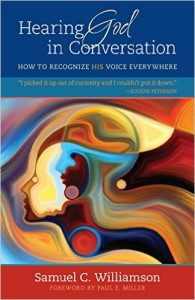One of the most common desires that a growing number of Christians express when talking about family and close relationships is to be “fully present.” We have learned of this interpersonal dynamic through the speaking and writing of spiritual and faith leaders, especially those who combine a bit of psychology with their spirituality and theology. Nationally and internationally, we have heard of this disposition from people like David Benner, Henri Nouwen, John Eldredge, Richard Rohr, Jean Vanier and Thomas Merton. And regionally we have heard presence advocated by folks like Larry Bolden, Basil Pennington and others.
Like many ideals presented to us, we begin to aspire to and share these concepts with others and express them in our conversations. Unfortunately, for many of us, the actual meaning and practice of something like being fully present can become foggy. What exactly am I trying to become? What does this look like? We need a refresher course or cheat sheet for how we want to change and become more attentive in our relationships. So, let us begin!
First, I have to say that this will be a simplification of the process that leads to our ability to be fully present or to have presence. The church reformer John Calvin wrote in The Institutes of the Christian Religion: “There is no deep knowing of God without a deep knowing of self and no deep knowing of self without a deep knowing of God.” And even earlier, St. Augustine prayed, “Grant, Lord, that I may know myself that I may know thee.” So, we are on a journey in knowing God and knowing ourselves and as we continue on that journey and are diligent in our attempts at being present, we will experience greater freedom in fully being ourselves and fully being open to others. This openness is one of the fundamentals of presence.
Benner wrote, “Presence is a gift, but it is also a practice;” in his book Soulful Spirituality (p. 154). This leads us to ask God for the motivation and understanding to grow in our presence. While, at the same time, consciously putting ourselves into situations where we can develop an inner stillness. We need a stillness of our souls or our hearts in order to be present. God has planted the seeds of stillness in our hearts by giving us grace, forgiveness, the promise of his presence from now to eternity and we have seen the demonstration of his love through the crucifixion, death and resurrection of Jesus. How shall we cultivate those seeds?
 Times of stillness and quiet are foundational for being able to be fully present. “One of the reasons most of us are limited in our ability to be present to others and ourselves is that we possess so little inner stillness. We are too full to be truly still – full of distractions, preoccupations, plans, worries, regrets, things that need to be rehearsed, and things that need to be reviewed.” (Benner, p. 146) I have found this to be true in my life, too. In fact, almost nothing has served to transform me more than times in stillness with the Holy Spirit. Nouwen called solitude the furnace of transformation. As we come to God with open and empty hands, we are signifying our dependence and desire to remove distractions. I believe this was the practice of Jesus during his years on earth and that he calls us to the same. In Luke 10 we read the story of Jesus visiting again with his good friends and calling Martha to presence, which was the one thing that she was lacking:
Times of stillness and quiet are foundational for being able to be fully present. “One of the reasons most of us are limited in our ability to be present to others and ourselves is that we possess so little inner stillness. We are too full to be truly still – full of distractions, preoccupations, plans, worries, regrets, things that need to be rehearsed, and things that need to be reviewed.” (Benner, p. 146) I have found this to be true in my life, too. In fact, almost nothing has served to transform me more than times in stillness with the Holy Spirit. Nouwen called solitude the furnace of transformation. As we come to God with open and empty hands, we are signifying our dependence and desire to remove distractions. I believe this was the practice of Jesus during his years on earth and that he calls us to the same. In Luke 10 we read the story of Jesus visiting again with his good friends and calling Martha to presence, which was the one thing that she was lacking:
As Jesus and his disciples were on their way, he came to a village where a woman named Martha opened her home to him. She had a sister called Mary, who sat at the Lord’s feet listening to what he said. But Martha was distracted by all the preparations that had to be made. She came to him and asked, “Lord, don’t you care that my sister has left me to do the work by myself? Tell her to help me!”
“Martha, Martha,” the Lord answered, “you are worried and upset about many things, but few things are needed—or indeed only one. Mary has chosen what is better, and it will not be taken away from her.” (NIV)
Have you ever felt like Martha? There is so much to be done and we feel like we have to do it! Yet, Jesus calls us to just one thing: to be present with him.
So, the first suggestion on cultivating the seeds of presence is to give yourself 20 minutes of stillness a day. I have a place in my home where I can sit down and become still and alone. Initially, a few years ago, this was the place where I would sit and cry and say to God that I didn’t know what was going to happen. I told the Lord that I felt like everything was falling a part and I didn’t know what to do. So, your stillness may start in chaos, but don’t give up. As thoughts come into your mind, respond by giving them to God. You may want to say, “Lord, this is yours. Father, take this away. Jesus, I release this to you.” And this may take some time. Eventually, you may develop a shorthand word as you feel God’s presence and you just say Jesus or Spirit.
We live in a time when multitasking has become the norm. The term first appeared in an IBM document in 1965. It was originally the function of a computer, but more recently has become the expectation for humans. We may talk on the phone while typing an email or drive an automobile while listening to the radio. We become so accustomed to doing more than one thing at a time that our brains accept it as normal. To be fully present with someone, we have to unlearn multitasking. With this in mind, the second suggestion for cultivating seeds of presence is to practice doing just one thing at a time. Try doing this a little each day. One of my biggest challenges is reading while eating or watching TV while eating. Yesterday, I tried eating and just savoring the food. The food tasted better. In his teaching on being fully present, Larry Bolden of Wellspring Group talks about the value of “savoring the moment.” In order to get to that place, we have to take in the whole experience. We have to focus on the words a person is saying or taste the flavor of each fruit or vegetable or spice to savor them. Decide that you are going to get less done instead of more tomorrow and mono-task! You may need to put fewer things on your “To Do List” or put only one thing on your list.
Especially, if we are sitting down to talk with someone, it is important to make sure that we can hear just his/her voice. In time, you may be able to do that in a noisy area, but you may need a quieter place. Consider your surroundings and how the outer noise may affect your inner stillness is the third suggestion. And don’t be timid to ask someone to repeat what they said if your own thoughts got in the way of your hearing them. You know how some folks seem to bring peace with them when they enter a room or approach to greet you? That is what you are aiming to develop. We all can feel that and being conscious of your surroundings can foster a more peaceful and personal presence.
An overarching motivation for our desire to be fully present is that it is a sign of respect and humility. We know that if we are fully present we will have more to give to the people around us. So, our inner and outer posture needs to mimic our respect for the other person who was created in the image of God. We want to respect the sacredness of the encounter. We will turn toward the person and look at them.
Perhaps another tool that we can use in cultivating presence is to imagine that we are sitting across the table from Jesus. How would we respond in that moment? We would want to receive all of the wisdom, knowledge, love and guidance that we could from Jesus. We wouldn’t want to miss a single syllable or gesture in his words and movements. We would want to have the laser focus of all of our senses on Jesus. If we believe in the reality of the indwelling presence of the Holy Spirit in believers and that we are members of the Body of the Messiah, then we are in fact encountering Jesus when we sit across the table from one of God’s children.
Begin the journey of being fully present to those you love. We need all of you.
Your presence is a gift only you can give.





 o move on to helping someone else or taking the focus off of me and putting it onto God and others. The song says, “I shake it off!” I am not bound by sin. I’m free.
o move on to helping someone else or taking the focus off of me and putting it onto God and others. The song says, “I shake it off!” I am not bound by sin. I’m free.